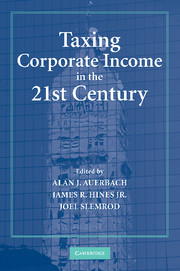Book contents
- Frontmatter
- Contents
- Contributors
- Preface
- 1 The Effects of Taxes on Market Responses to Dividend Announcements and Payments: What Can We Learn from the 2003 Dividend Tax Cut?
- Comments
- Comments
- 2 Dissecting Dividend Decisions: Some Clues about the Effects of Dividend Taxation from Recent UK Reforms
- Comments
- Comments
- 3 The 2003 Dividend Tax Cuts and the Value of the Firm: An Event Study
- Comments
- Comments
- 4 How Elastic Is the Corporate Income Tax Base?
- Comments
- Comments
- 5 An Empirical Examination of Corporate Tax Noncompliance
- Comments
- Comments
- 6 On the Extent, Growth, and Efficiency Consequences of State Business Tax Planning
- Comments
- Comments
- 7 Corporate Taxation and International Competition
- Comments
- Comments
- 8 The Changing Role of Auditors in Corporate Tax Planning
- Comments
- Comments
- 9 Taxation and the Evolution of Aggregate Corporate Ownership Concentration
- Comments
- Comments
- Index
- References
8 - The Changing Role of Auditors in Corporate Tax Planning
Published online by Cambridge University Press: 30 July 2009
- Frontmatter
- Contents
- Contributors
- Preface
- 1 The Effects of Taxes on Market Responses to Dividend Announcements and Payments: What Can We Learn from the 2003 Dividend Tax Cut?
- Comments
- Comments
- 2 Dissecting Dividend Decisions: Some Clues about the Effects of Dividend Taxation from Recent UK Reforms
- Comments
- Comments
- 3 The 2003 Dividend Tax Cuts and the Value of the Firm: An Event Study
- Comments
- Comments
- 4 How Elastic Is the Corporate Income Tax Base?
- Comments
- Comments
- 5 An Empirical Examination of Corporate Tax Noncompliance
- Comments
- Comments
- 6 On the Extent, Growth, and Efficiency Consequences of State Business Tax Planning
- Comments
- Comments
- 7 Corporate Taxation and International Competition
- Comments
- Comments
- 8 The Changing Role of Auditors in Corporate Tax Planning
- Comments
- Comments
- 9 Taxation and the Evolution of Aggregate Corporate Ownership Concentration
- Comments
- Comments
- Index
- References
Summary
We acknowledge the thoughtful comments of conference participants, Robert Bushman, Courtney Edwards, Steve Kaplan, Lil Mills, Jana Raedy, Kevin Raedy, John Robinson, Richard Sansing, Joel Slemrod, and numerous practitioners at leading accounting firms and corporations. We appreciate the research assistance of Scott Dyreng, Allison Evans, and Vincent Thorn. A prior version of this chapter was titled “Corporate Tax Planning in a Sarbanes-Oxley World.”
Introduction
This chapter examines the changing role that auditors play in corporate tax planning in the face of recent events, including the well-known accounting scandals, passage of the Sarbanes-Oxley Act, and regulatory actions by the Securities and Exchange Commission (SEC) and the Public Company Accounting Oversight Board (PCAOB). Although the events are recent, still being debated, and the data limited, one thing is clear in the preliminary data. The amount of tax services that audit firms provide to their audit clients has declined dramatically during the period 2001–2004. Furthermore, most of the tax work appears to have shifted among accounting firms because the amount of tax work that accounting firms perform for non-audit clients has increased sharply.
We find that in 2001, S&P 500 companies, on average, paid their auditors about the same fees for their audit work as they did for their tax work (i.e., the combination of tax compliance, tax advice, and tax consulting). Two years later, in 2003, the S&P 500 were paying twice as much for audit work as tax work.
- Type
- Chapter
- Information
- Taxing Corporate Income in the 21st Century , pp. 307 - 337Publisher: Cambridge University PressPrint publication year: 2007
References
- 52
- Cited by

